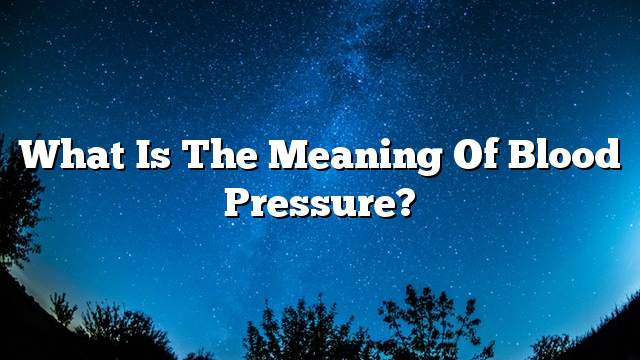When the heart contracts, the blood flows through the walls of the blood vessels causing it to expand, and the force that runs through the blood vessels walls called Blood pressure . Blood pressure depends on the amount of blood pumped and the amount of resistance to the wall of blood vessels. Blood pressure readings are determined by reading the systolic pressure or what is known as high pressure and reading diastolic pressure or what is known as low pressure. It is measured in mm Hg.
Systolic pressure (high pressure): Of his name is a blood pressure when the heart pumping blood, ie, when the heart is constriction of the normal adult is equal to 120 mmHg.
And diastolic pressure (low pressure): It is also known as blood pressure in the period between contraction, ie in the interval or the expansion of the heart and the normal adult is equal to 80 mmHg.
He writes blood pressure and reads as follows: 120/80 mm Hg, 120 x 80 mm Hg. And is measured using specialized measuring instruments for blood pressure, including what is manual mercury and other electronic and other wears such as the watch on the wrist and many other types.
Blood pressure readings vary from person to person depending on age, weight, and size. Children have lower blood pressure than adults, and overweight people have higher reading scores and so on. But for a normal adult, as we mentioned, it is equal to 120/80 mm Hg. It is the constant measure of blood pressure used by the doctor in assessing the blood pressure of people on the basis of which the doctor determines if the person has high blood pressure or suffers Of low blood pressure.
Because blood pressure depends on the flexibility of the blood vessel wall, the amount of blood vessel resistance to the amount of blood pumped, any factor that affects the flexibility of these vessels or affects the amount of blood pumped from the heart will affect the reading of blood pressure. The greater the amount of blood pumped from the heart, the greater the resistance of the walls of the blood vessels. The higher the blood pressure, the smaller the walls of blood vessels, the less elastic the blood pressure will increase.
The factors that affect stress and cause it to rise are: nervousness, tension, weight gain, heart and arterial disease, family history (if there are cases of high blood pressure in the family it will increase the likelihood of occurrence of people but they do not necessarily cause them ), And the treatment of some types of drugs and other factors and factors.
